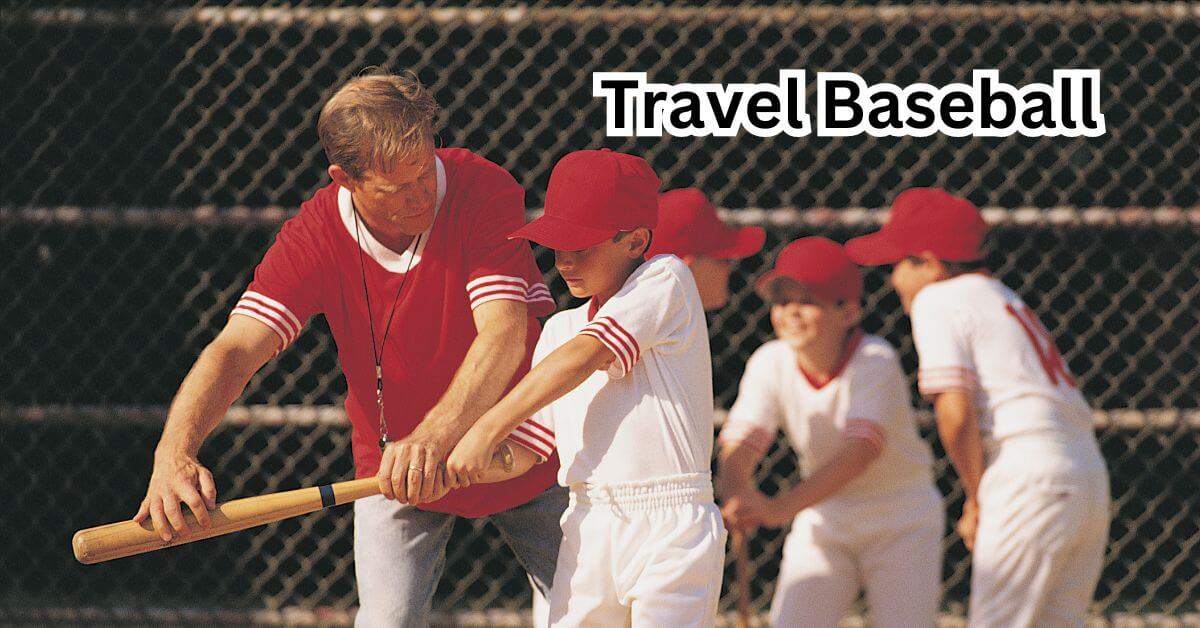Let’s talk about baseball—travel baseball, to be exact.
For many, moving from the Little League to travel baseball feels like catching a curveball. After all, it’s more than just a pace change; it’s about trading Saturday afternoon matches on a grassy field for serious club competitions that come with a higher price tag.
You might be thinking, “Is this the right play for my little slugger?” or “How do I even go about choosing a team?”
Well, here’s our chance at bat. We’ll walk you through everything youth travel baseball has to offer, including answering these questions and more.
What is Travel Baseball [Explained]
Travel baseball is just what it sounds like. It’s when youth teams have to travel in order to have their games and tournaments. This is usually the next step after traditional recreational or Little League.
Since the level of competition is much higher, it can help them develop their skills.
But preparation comes at a cost—literally. And all that time on the road can take up your schedule very quickly. But despite all that extra work, they’ll get an exciting adventure out of it. Now, they’ll face off against teams from different cities, states, and sometimes even countries.
The love for Travel Baseball is Growing Fast.
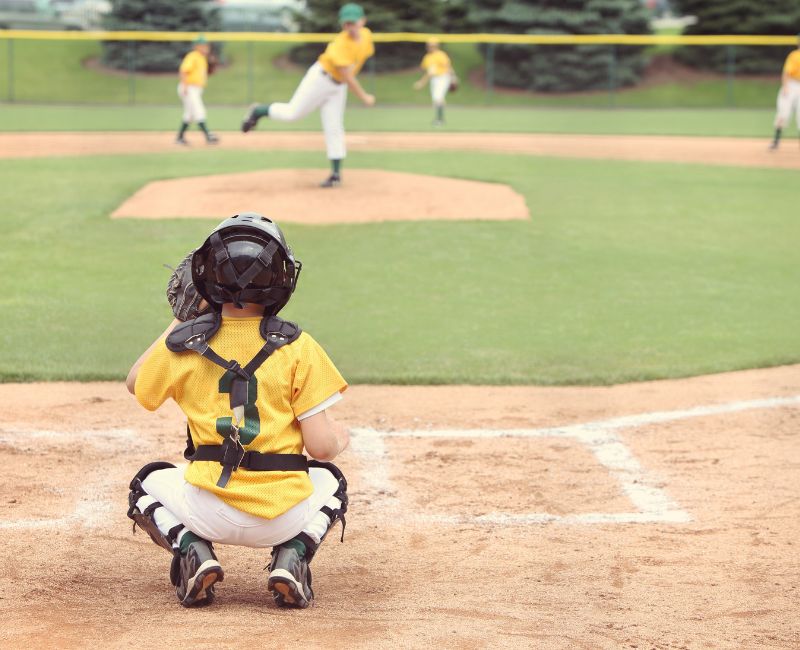
In recent years, travel baseball gained an exponential amount of popularity and saw thousands of teams pop up across the country.
Before the 90s, it was a relatively niche experience only limited to players nestled in regions like Texas and California.
Nowadays, participation is considered necessary for young players wanting to sharpen their skills and go up against some really tough competition.
Instead of focusing on the local leagues like recreational youth baseball does, travel ball operates under various organizations, hosting hundreds of tournaments each year.
Some big names include USSSA (United States Specialty Sports Association), AAU (Amateur Athletic Union), Triple Crown Sports, and Perfect Game.
The ambitious goal for any team is to face off against as many different teams as possible to gain experience and test their skills.
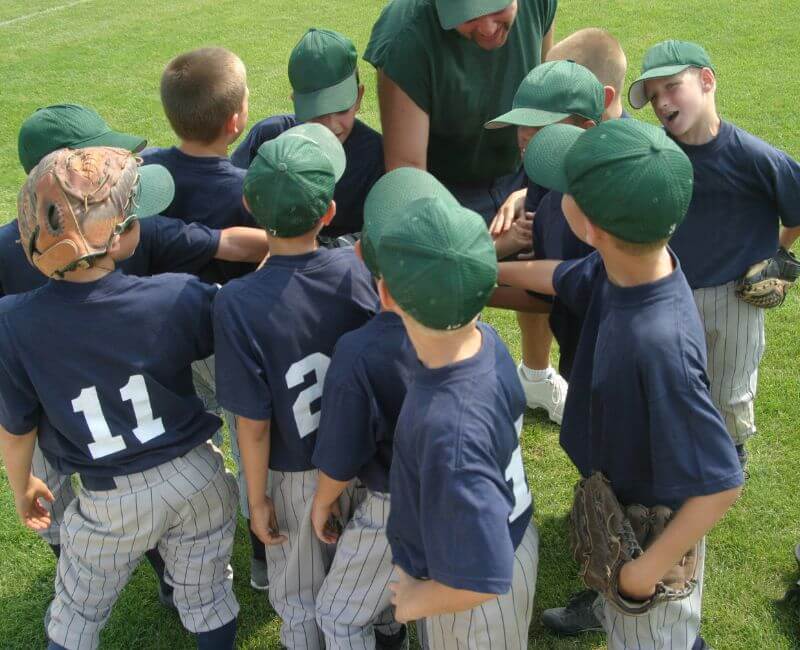
Everyone can create a travel baseball team. It doesn’t matter if you’re a parent, high school teacher, or someone who coaches college kids.
The highlight of the season is the travel baseball tournament. Bringing together talented teams from different parts of the world to compete.
This lets players show their skills to a bigger audience, including scouts and college coaches. These tournaments are organized by many institutions and happen locally, regionally, or even nationally.
There’s nothing cooler than the USSSA World Series, though. Every year, it’s hosted by the United States Specialty Sports Association.
You’ll find talent from all over America coming here to fight for that top spot. But another epic tournament is the Triple Crown Summer Nationals, where they hold it at Myrtle Beach
in South Carolina. It attracts teams from everywhere and is known for great competition and vacation vibes.
A unique little competition is held in Cooperstown, New York, known as the Cooperstown Dreams Park Tournament.
Cooperstown, known as baseball’s birthplace, offers a unique week-long stay in baseball-style barracks. You can visit the National Baseball Hall of Fame.
These intense and challenging tournaments bring out some of the most talented players young kids have to offer. It’s also a great way to boost your young player’s confidence in playing on those big stages!
Different Levels Of Travel Teams And Their Requirements
It’s not just one level fit all for travel baseball teams. They’re organized into various levels based on skill, experience, and commitment from players.
Imagine putting someone who only knows how to throw with moderate force into a contest against someone who does it with full force.
The team you choose for yourself should align with your skill level, how much free time you have, and your developmental needs as a player. Here’s an overview of different levels:
1. Local Travel Teams: For beginners starting their journey through travel baseball. The games they play are mostly local or within a close driving distance. Practices only happen a few times a week, and games during the weekend.
2. Regional Travel Teams: For players with more experience and higher skill levels. They go on trips for games and tournaments that will require overnight stays at places. Commitment level is higher, with practices being more frequent along with a longer season.
3. Showcase Travel Teams: The big leagues of young kid baseball players. These teams are made up of highly skilled people who are very serious about baseball. They have college scouts and recruiters present their games. This includes going to different states for showcase tournaments.
You’ll need to be extremely committed to even think about trying out for this team, and their practices are rigorous and frequent, lasting all year round!
Benefits of Playing in a Travel Baseball Team
A lot of benefits come from playing travel baseball.
The biggest one? It can help players get to their goals. It’s not just about playing a game, especially when you want to make it big. It’s actually an experience that provides lifelong skills that can be applied everywhere else.
Competition in recreational leagues is nothing compared to this. It’s way higher. This allows players to grow new and old skills at a faster rate.
There’s also an intense training schedule that demands discipline, resilience, and focus. These qualities go beyond just sports.
Participating in high-profile tournaments also gets the attention of other coaches and scouts. Which makes it easier for them to open doors for scholarships and professional contracts.
Traveling away from home just for games might seem like a drag, but it builds responsibility and maturity. It is a demanding journey for sure, but very rewarding.

Did MLB Players Play Travel Baseball?
Definitely! A lot of Major League Baseball (MLB) players used travel baseball as their starting point, too. It gives them all the exposure they need, honing skills at such a young age along with fierce competition.
Take Bryce Harper, for example. He’s one of the biggest names in MLB today. His journey started back when he was a child playing for the Southern Nevada Bulldogs 14U travel team. The opportunity came up where he could go against older players who were more experienced than him. This experience helped shape his professional career.
Albert Pujols also played travel baseball when he was younger on his team called Fort Osage Indians Travel Team before sailing into the Hall of Fame.
Clayton Kershaw? Yeah, him too! Another name you hear often in MLB didn’t start there either — he played for the Dallas Tigers Travel Team where he developed early on gaining crucial skills and discipline that are instrumental in his success today.
How to Find a Travel Baseball Team in Your Region?
If you’re a young baseball player who wants to take their skills to the next level, then joining a travel team is a great opportunity. If you are a parent and want to make your child the next MLB star, then travel baseball teams are a great place to start with.
These teams play across the country and allow players to show their talents against top-tier competition. But how do you find one of these teams?
Here’s a guide on how you can join a travel baseball team in the USA.
Check your local youth baseball organization.
Your first step should be checking with your local youth baseball organization. Chances are they have travel teams that play in leagues and tournaments outside of the regular season. If they don’t, then it’s likely they know someone who does.
Drop by showcases and camps.
In-person events like showcases and camps are great places to meet coaches and scouts from travel baseball teams. They’re designed specifically so players can showcase their skills and get noticed by recruiters.
Go online.
The internet holds many answers, including finding a travel baseball team. Websites like USSSA Baseball, Perfect Game USA, and Travel Ball Select list lots of travel baseball teams based on state, age group, and skill level — all at a click away.
Talk to other parents and players.
If you want first-hand experience, then talk to other parents or players who have been through this process before. They can give useful insight into which teams are reputable, well-run, and competitive.
For example, if you live in Texas, then one option could be the Texas Bombers Baseball Club — an organization that has multiple teams at different age levels and is known for developing young talent. You can learn more about them by visiting their website or attending one of their tryouts.
How to Find the Perfect Travel Baseball Team?
Identify the Skill Level and Commitment of the Player
First thing first, you need to figure out how committed your child is to the sport and their skill level. If he is naturally gifted athlete then you should help him to follow his dream.
Research Local and Regional Teams
Begin by looking at teams that are close by. These teams usually have varying levels of skill and serve as great entry points for most players.
You can check their websites and social media pages to learn more about them such as philosophy, coaches, players, and game schedule.
Attend Local Games and Practices
Sitting in on local games and practices allows you to get a firsthand look at how they run things. You’ll be able to see their coaching style, how they interact with the players, and the overall team dynamic. With this insight, it’ll be easier to make a decision.
Speak with Coaches and Parents
While observing is good, it isn’t enough. Take some time out of your day or week to speak with coaches.
This allows you to gain an understanding of their training methods, the expectations they have for your child, and the goals they want them to reach. It’s also good practice to talk to other parents so you can get a general idea of what people think about the team.
Consider Logistics
Logistical factors are important, too, so don’t forget about them. Make sure that the team’s practice location is suitable for you and your family’s schedule since it may be far away from where you currently live or work.
The game schedule should be looked at as well because there could be conflicts in dates that would keep you from attending games.
Tryouts & Evaluations
Most teams hold tryouts or evaluations for people who are interested in joining. If this is offered, take advantage of it because it gives your child the chance to showcase their skills and for you to see if the team would be a good fit.
A player’s evaluation is also helpful because it gives you insight into how strong the team itself is.
Travel Baseball Season Preparations
Preparations before the pre-season
Before the baseball season starts, you’ll want to make sure that your child is mentally and physically ready for the long days ahead.
So, let’s start with an off-season workout routine to help build strength and agility. But don’t forget about eating well and getting enough sleep. Plus, practicing regularly can take their fielding, pitching, and hitting skills way up.
During the season
Once the season starts, it’s important to stay fit and perform at your best. You’ll want to communicate with their coach to keep track of your child’s progress as well as any areas they need improvement in.
Another thing you should do is show up to their games and practices. It helps you stay in tune with how the team is performing and also supports your child. And finally, always keep their lines of communication open, whether it’s about pressure or their anxiety.
Post-Season
After a long season, it’s important to take a break. Reflect on the games you had together. Acknowledge all the good things they did but also focus on areas they can improve in.
Give them some downtime so they can rest and recover. Even though they’re chilling around, don’t let them become bums — physical activity is still important for them during this time.
Travel Baseball vs. Little League
Both types of baseball have their own unique experience and benefits that come along with it. The choice of which one to put your kid into mostly depends on what they want out of it.
For example, travel baseball is more competitive. It attracts players who are committed to sports no matter what and are willing to travel around just for a game against top talent in various regions. Not only does this provide intense competition but also high-level coaching.
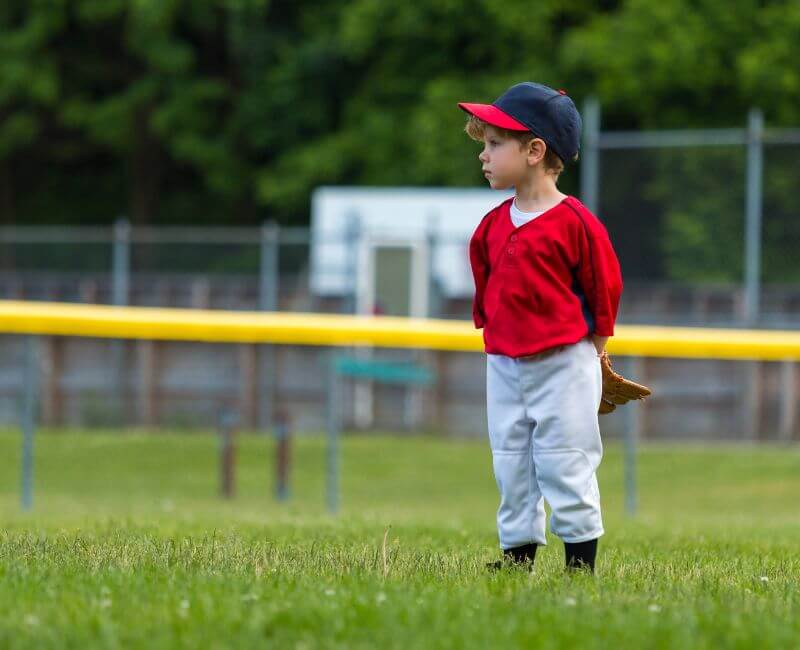
It does require a lot of time, as seasons are much longer than in little leagues with more games and practices.
If you want your child exposed more, then this would be a good option, as you can see from Bryce Harper, Albert Pujols, and Clayton Kershaw.
Now, little league baseball is less demanding. It’s generally more focused on the community and not so much on traveling and time.
It’s actually a great option for kids who still love the sport but aren’t ready to commit to such a demanding schedule. They focus on learning fundamental skills, enjoying the game, and fostering a sense of community.
You can learn more here: Travel Baseball Vs Little League
The Cost of Playing Travel Baseball
If your kid has a future in baseball, you might want to consider enrolling them in travel baseball. The only problem is that this option is much more expensive than local leagues.
Local leagues tend to have low costs because they don’t do as much traveling as travel teams have to do. On top of paying for the actual games themselves, there’s also the top-of-the-line coaching and amazing facilities that the team needs to cover.
You’ll be hit with fees like equipment, uniform, tournament, travel (like gas and airfare), and a team fee.
The team fee alone can include things like league fees, practice facility rentals, and salaries for the coaches.
And let’s not forget about any extra training or lessons they need in order to take their skills up a notch.
It’s always good to ask the people organizing the league what you’re paying for specifically because then maybe it won’t seem so bad (it probably will still seem bad, though).
But it really does come down to where you live.
Depending on that, it could cost you anywhere from $1,500-$3,000 per season. And if you’re on one of those elite teams competing at national tournaments, then I’m sorry, but it’ll probably cost way more.
Find Out How To Choose A Coach
A good coach doesn’t just teach how to play sports but also builds discipline and confidence, along with fostering a love for the game. Here are some tips on picking a coach:
Experience And Certification: A coach should always have some kind of experience coaching youth sports, but having proof that they passed some coaching program can give you peace of mind, knowing they know what they’re doing.
Coaching Style: Every coach is different and will treat their athletes differently, too. Some will be very intense in trying to push their players, while others are more relaxed yet inspiring. Pick what works best with your child’s personality.
Communication Skills: A good coach knows how to explain things in a way that’s easy for their athletes to understand. They should also be great at talking to you and other parents.
Focus On Development: It’s better for your kid to improve their skills rather than just win all the time. Look for coaches that will work with them on that.
Reputation: Finally, look into what other people say about the coach. Not only other players but parents, too. It doesn’t hurt to ask around or even watch them during practice if you can.
Things to Know About Uniforms and Equipment in Travel Baseball
Uniforms and equipment are a necessary investment in travel baseball. It can be beyond what you expect from Little League. Here’s a quick rundown of what your child might need:
Uniforms: Most travel baseball teams have their own custom jerseys that come with pants, caps, belts, and socks. Some teams may even have home and away uniforms, so check with the manager first.
Gloves/Mitts: Get your child a good quality glove or mitt that suits the position they play. For example, catchers and first basemen have their own special mitts, while outfielders use bigger gloves compared to infielders. Check out the Best Youth Infield Gloves
Bats: Bat rules can get very specific, depending on the league. Before you buy one, make sure you understand what kind is allowed. Also, consider their height, weight, and hitting strength when selecting the right bat size.
You can check out my list of Best Youth Baseball Bats
Helmets: No matter how old or young your child is, they need a batting helmet. Some leagues even require faceguards as well. Check out the Best Youth Baseball Helmet
Cleats: Running on grass and dirt requires traction, which is why cleats are used in baseball. However, be aware that some leagues don’t allow metal spikes, so again, you should always check if there are any shoe restrictions.
Protective gear: Depending on the position they’re playing at, your kid may need extra protection such as shin guards for their legs or a chest protector for their torso
FAQs
What is a good age range for travel baseball?
Travel baseball typically starts around 7 or 8 years old and goes through high school. However, the age that you can join may differ depending on the league or team.
How much does it cost to play travel baseball?
The price of playing travel baseball could be greatly different depending on things like where you live, what team you’re on, and at what level you play. You’ll have to pay for league fees, uniforms, equipment, and even the costs of traveling and staying in other cities for away games.
How often would we need to practice?
Usually, travel teams practice more often than recreational ones. It’s common for them to meet several times each week. But it will depend on the time and dedication your child’s coach expects.
How far do they have to go?
Again, that’ll depend on what league your child signs up for. Some teams only need to go a couple of miles, while others will have to cross city lines.
Can my child also play another sport?
It all depends on how much time both sports require. Understandably, travel baseball takes up quite a bit of time and energy, so consider if they have enough for both.
Overall Worth of Travel Baseball
Traveling with a baseball team is no joke. For players and families alike, it’s considered a big commitment that takes up lots of time, money, and energy.
And while it opens up new opportunities, the best reward for joining one is amazing! The skills learned, and knowledge gained from playing at higher levels is priceless.
Plus, it builds character, helping to teach important lessons like teamwork, dedication, success handling, and, most importantly, failure handling. And let’s not forget about the friendships built along the way from spending hours with teammates in different places across the country.
Even though some costs and sacrifices come with this commitment, most families say joining a traveling baseball team was totally worth every bit of it.
Just remember, the end goal is to love the sport and grow as a person.
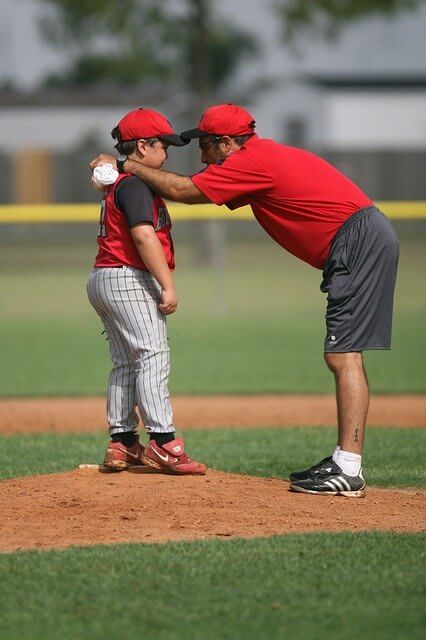
Hello everyone. My name is Jason Butler, and I live in California, America. I was a professional AAA Minor League Baseball player. I lost my chance of playing MLB for injury issues, but I did not lose my love for baseball. I attended the coaching training program and am now working as a coach in a small school in San Diego.
I always love to share my experience and knowledge if that can help you. Play baseball, and stay fit.
